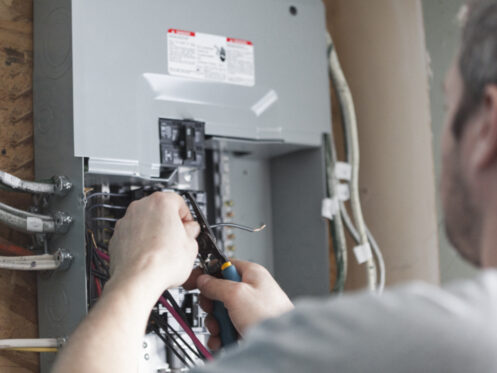Are you worried about the safety of your home’s electrical system? Electrical issues pose by far the greatest risk to homes and people, which is why annual electrical inspections are important. Depending on the age of your home and the condition of its electrical wiring, the only solution to preventing electrical hazards may be to have your whole home completely rewired.
In this article, we’ll look at the various situations and issues that indicate when whole-home rewiring is necessary.
Knob-And-Tube Wiring
Knob-and-tube wiring was the first type of wiring used in the US. It started being used in the 1880s and was phased out by the 1940s. In this type of wiring, you will see porcelain tubes where the wires pass through wall studs and floor joists, as well as porcelain knobs along the length of the wires that help support them.
Knob-and-tube wiring is considered obsolete, and any homes with it should be rewired. Although the National Electric Code (NEC) doesn’t require replacing knob-and-tube wiring, it is still a good idea since it can be a major safety hazard and possibly cause a fire. The biggest risk is when the wires are in areas where they are surrounded by building insulation
Fuse Box
Another certain sign that your home should be completely rewired is if your electrical panel has fuses instead of circuit breakers. Circuit breaker panels have been the standard since the mid-1960s. If your home has a fuse box, there is a high chance that most of your electrical wiring is original and your electrical system hasn’t been updated in decades.
Most electrical wiring will only last for around 50 years as the insulation or sheathing around the wires slowly degrades over time. If a home has an original fuse box, you can be fairly certain that lots of the wires are in poor condition.
Bare or frayed wires are also a major fire hazard, as they will allow the current to potentially arc from the live wire across to the neutral wire. This allows the electricity to suddenly flow unrestricted, which instantly causes a massive surge in current. The surge can cause the wires to almost instantly become extremely hot and cause anything nearby to catch on fire. Both fuses and circuit breakers are designed to prevent this from happening.
If the power does surge due to an arc fault or any other issue, the fuse will blow, or the breaker will trip so that power instantly stops flowing through the wires. However, circuit breakers are safer and more effective in this regard since old fuses aren’t as reliable.
Aluminum Wiring
Aluminum wiring was used in approximately two million American homes that were built in the late 1960s and early 1970s. While the NEC doesn’t ban the use of aluminum wiring, it is almost never used these days. The reason is that it is much more prone to overheating than copper wiring, which can make it a major fire hazard. This is why almost all electricians recommend completely rewiring any home with old aluminum wiring.
The problem is that it is virtually impossible for you to tell on your own if your home has aluminum wiring or copper since all of the wires are hidden. The only way to know if wires are aluminum is to visually inspect them, as the sheathing on aluminum wiring is stamped “AL.” If your home was built in the 60s or 70s, having an electrician check if your wiring is aluminum is a good idea.
This is also something that an electrician would always look for when performing an electrical safety inspection. If the inspection reveals that your wiring is aluminum, you will want to have your home rewired as soon as possible due to the fire risk.
Two-Prong Electrical Outlets
We occasionally encounter older homes with at least some old two-prong outlets instead of modern three-prong ones. Three-prong outlets have been required by the NEC since 1971. If your home has any two-pronged outlets, it also means that your electrical system is extremely outdated, and you should have your home fully rewired as soon as possible.
Two-prong outlets are extremely dangerous because they aren’t grounded like three-prong outlets. Grounding is important, as the ground wire allows the outlet to safely disperse excess electricity in the event of a short circuit or power surge. If the outlet isn’t grounded, the electricity will flow out elsewhere.
This means it could easily fry whatever is plugged into the outlet. If you touch the outlet or plug, your body can also conduct the electricity and result in you getting a nasty shock or even fatally electrocuted. The wires in an ungrounded outlet are also much more likely to catch fire if the current suddenly spikes.
Consistently Flickering Lights
The lights in a home can flicker for a variety of reasons, and not all of them are things you necessarily need to be very concerned about. For instance, if just one light fixture keeps flickering, it may just be that the bulb is slightly loose or that the contactor in the socket is bent or worn out.
If you have multiple fixtures that frequently flicker or the lights often flicker in various parts of your home, it’s important to have your electrical system inspected. This is because flickering lights can often indicate that there are loose electrical connections or damaged wires.
In this case, you may just need to have the wiring in the affected circuits replaced. However, if an electrician determines that there are issues in multiple circuits, you’re usually better off erring on the side of precaution and having your whole home rewired. If your electrical system has multiple issues, it generally means that your wiring is old or your home wasn’t wired correctly. As such, whole-home rewiring will be the best choice for preventing potential safety hazards.
Circuit Breaker Frequently Trips
Circuit breakers should only trip if there is a power surge or you’re overloading the circuit and trying to draw too much power. If you have one circuit breaker that keeps tripping, it could be that you have a faulty appliance or that the wiring in that circuit is loose or damaged. In this case, you’ll need to have an electrician test the appliance and check the circuit. Depending on what the electrician finds, they may then want to perform a complete inspection of your entire electrical system.
If the wiring in only that circuit is bad, you’re usually fine just to rewire that particular circuit. If you have different circuit breakers that keep tripping, it usually indicates that multiple wires are loose or bad. In this case, you’re definitely better off rewiring your entire home just to be safe.
At Mighty Pine Heating & Air, our team of licensed electricians is ready to help if you need a safety inspection, whole-home rewiring, or any other electrical services in the Wheat Ridge area. As the area’s top HVAC company, we’re ready to handle all your heating and air conditioning needs. For more information on the benefits of whole-home rewiring or to schedule an electrical safety inspection, contact us today.



